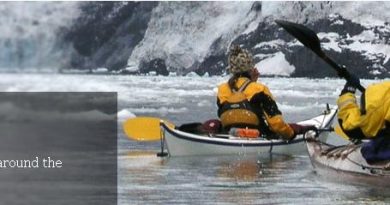The Arctic 5 Meeting in Chelsea – Disaster, or Just Disappointment?
The Foreign Ministers of the five Arctic coastal states – Canada, Denmark, Russia, Norway and the United States – gathered in Chelsea, Quebec on March 26 to discuss a number of Arctic issues, including the management of the Arctic Ocean, continental shelf delimitation and search and rescue. Unfortunately, the major outcome of the meeting was not a political declaration, or some inspired new regulatory framework; it was the embarrassment of the Canadian foreign minister and a possible death knell for the A5 format.
This was the third meeting of the so-called “Arctic Five”. Following the Russian North Pole flag-planting episode in August 2007, which sparked a media furor over a new ‘Cold’ War, Norway thought it beneficial to bring legal representatives from the five countries together to discuss their respective border disputes and the continental shelf delimitation process. (Under the 1982 UN Convention on the Law of the Sea – UNCLOS – states can claim sovereign rights over the seabed up to 350 miles from their coastline should their continental shelf extend past their 200 mile Exclusive Economic Zone or EEZ.) International lawyers meeting in Oslo in October 2007 thus began a dialogue to resolve competing continental shelf claims in the Arctic through the legal process outlined in UNCLOS.
Around the same time, the Danish foreign ministry began planning a high level political meeting to commit the Arctic coastal states to an orderly management of Arctic problems on the basis of existing international law. The result was a meeting in Ilulissat, Greenland, in May 2008, which produced the Ilulissat Declaration: a joint statement of the Arctic 5 in which they publicly committed to the existing international legal framework outlined in the law of the sea and the orderly settlement of overlapping claims. The meeting was a foreign policy coup for the Danes and one of, if not the most, important document in Arctic relations to date.
So one can forgive Canadian Foreign Minster Lawrence Cannon for wanting to build on the success of that meeting. The Ilulissat meeting was hailed as a one-off; a complement, not a competitor, to the Arctic Council, which includes not just the A5 but Finland, Iceland, Sweden and six indigenous Permanent Participants. But Cannon, apparently eager to demonstrate Canadian leadership in the Arctic (as so many in the Arctic punditry had encouraged), put together a meeting of the A5 at the highest level: foreign ministers from all of the states including (insert drum roll) US Secretary of State Hillary Clinton.
In the weeks leading up to the meeting, Iceland, Finland and Sweden expressed their disappointment over being excluded, once again, from an important meeting concerning Arctic matters. And the Canadian Arctic indigenous groups, despite meeting with Cannon the week before, were nonplussed. But it all might have been worth it had Clinton not totally blindsided Cannon immediately before the meeting by iterating, in a prepared statement, her regrets over the exclusive guest list. As if to mark this disapproval with an exclamation point, Clinton declined to join the concluding press conference. With the other three foreign ministers deciding not to participate in the traditional ‘family picture’, Clinton’s absence too obvious to overcome, the defining moment of the Chelsea A5 meeting was of Cannon, alone at his podium, defending the guest list and rebuffing accusations of being insensitive to the rights of indigenous peoples.
A disappointment, yes; but perhaps not all was lost on that March day in Chelsea. Despite its many failures, Cannon’s Arctic meeting had some successes too. It reaffirmed, at the ministerial level, the A5’s commitment to international law. And while another declaration would not have been possible – Ilulissat being the extent to what the Americans would consent to – it was, and is, a huge coup to have gotten Arctic affairs on the radar screen of the US Secretary of State. Up until this year, the American position on the Arctic had been largely agnostic: they didn’t know, and they didn’t care. As a result, they have frequently played the role of spoiler on Arctic initiatives. It now seems they are ready to engage, and that is good news for those who are anxious for more concrete outcomes from the Arctic Council, a largely deliberatory body to date.
Whether this marks a death blow for the A5 format is anybody’s guess. Its critics rightly see the A5 meetings as an opportunity lost to empower the Arctic Council, and an attempt to retract what little influence indigenous groups have achieved in circumpolar relations. But the A5 format, and its commitment to UNCLOS, is very good for the Arctic coastal states. They have a lot to gain from the provisions of the UNCLOS, and very little to lose. Russia, for one, recognizes this, and is likely to continue to champion discussions among the coastal states. As the Danish Ambassador to Canada recently remarked, the Russians love the Ilullissat Declaration, saying it is like a fine wine – it gets better every year.
The legitimacy of the A5 is debatable. It undermines the inclusiveness of the Arctic Council, and risks relegating the environmental, scientific and cultural issues that have marked its agenda since 1996 to a secondary tier of ‘low politics’. But it is also the right, and responsibility, of states to discuss and settle their boundary disputes. It would be odd to ask the A5 countries to do so within the cumbersome and slow processes of the Arctic Council, and with the input of non-state and other state actors. There is only one thing we can say with utmost certainty regarding the future of the A5 – Canada will not be hosting another one of its meetings anytime soon.


